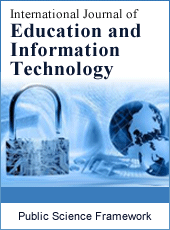International Journal of Education and Information Technology
Articles Information
International Journal of Education and Information Technology, Vol.2, No.3, Jun. 2016, Pub. Date: Jul. 8, 2016
Parents Socio-Economic Status and Students Academic Performance in Nigeria Educational System
Pages: 14-18 Views: 4870 Downloads: 9290
[01]
M. T. Usman, Department of Primary Education Studies, Federal College of Education, Kano State, Nigeria.
[02]
U. Mukhtar, Department of Primary Education Studies, Federal College of Education, Kano State, Nigeria.
[03]
S. Auwal, Ministry of Education, Kano State, Nigeria.
Many years ago, in Nigerian education system intelligence was thought to be the sole determinant of academic achievement of students but nowadays, emphasis is on parent socio-economic status which greatly affects student educational achievement, educational process take place either formally or informally. Its benefits to individuals and society include economic and social development. From the economic point of view, education is regarded both as consumption and investment but only few peoples understand. Higher academic performance could be traced to active parental influence and participation in the student aspects. These influences includes togetherness of parents, parent involvement, profession, interest in education, learning materials at home, family size, stability, background, social stratification and socio-economic status of parents which consider to be a major factor in determining the academic achievement of students. If family are involve or participate in the child education in positive ways, so many noticeable changes will be observed which can be overt or covert, these are attitude, behavior, test score, attendance records, rate of graduations and high number of enrollment in higher education. The study samples were randomly selected from four (4) secondary schools in Dala local government area of Kano State which consists of eighty (80) students was selected. Well instructed questionnaire was the major instrument used in collecting data for this research which is validated by the use of pilot study. The students were intimated with goals of the research, confidentiality of their responses and how to respond to the questions or items on the questionnaire. The correlations between two responses and the result revealed a significant of (p < 0.05) which was proved statistically to be significant. Government should embarks on public enlightenment campaigns on the essential need for equal education of both boys and girls, consider the income and expenditure of parents and regulate the prices of school fees, educational materials and more public libraries should be built in many areas of the country.
Educational System, Parents Socio-Economic Status, Students Performance and Educational Achievement
[01]
Krikorian (1994) Cited Kim (2003). Naturalism and Education, retrieved from wikipeadia.com on 12-10-2015.
[02]
Allen R. T. (1999). The Essential Task of Education Zaria. Northern Publishing Company Ltd.
[03]
Anyanwu, E. J et al (1997). The Structure of the Nigerian Economy. Onitsha Joanee Educational Publishers Ltd.
[04]
Yesufu, I. M (2000). The Human Factor in National Development. Ibadan. Spectrum Books Ltd.
[05]
Acoseh, 0. 0 (1983), Factors Influencing School Success, Education and Development. Ibadan.
[06]
Blake, K. C (1980), Sociology of Education for Africa. London George Allen and Union Limited, Great Britain.
[07]
Davies, A. M (1984), Social Class Influence upon ‘Learning, Cambridge University Press, London.
[08]
Fafunwa, A. B (1963), Problems of Child Performance in Africa. Journal of Education Vol. 2 No. 2.
[09]
Fafunwa, A. B (1974), History of Education in Nigeria. George Allen and Union Limited, Great Britain.
[10]
Galbraith, J. K (1964), The Principles and Practice of Education London, Hodder and Strenghton Pg. 3.
[11]
Oguranti, A. E (1982), Basic Principles of Teaching Management and Design, New York McGraw Hall Book Publishing Company.
[12]
Okorie, F. 0 (1984), the Impact of Parental Literacy in Lagos. Spectrum Books Ltd.
[13]
Stone, E. C (1965), An Introduction to Educational Psychology - Cambridge University Press, London.
[14]
Zigler, E. K (1969), Handbook of Social Psychology. Addison Publishing Press, New York.

ISSN Print: 2381-7410
ISSN Online: 2381-7429
Current Issue:
Vol. 5, Issue 1, March Submit a Manuscript Join Editorial Board Join Reviewer Team
ISSN Online: 2381-7429
Current Issue:
Vol. 5, Issue 1, March Submit a Manuscript Join Editorial Board Join Reviewer Team
| About This Journal |
| All Issues |
| Open Access |
| Indexing |
| Payment Information |
| Author Guidelines |
| Review Process |
| Publication Ethics |
| Editorial Board |
| Peer Reviewers |


